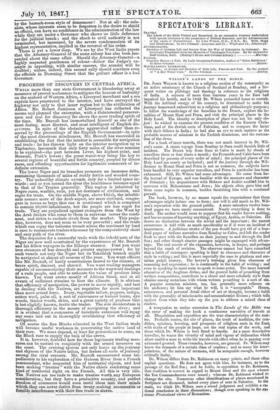, PROGRESS OF DISCOVERY IN CENTRAL AFRICA. WHILE more than
one state Government is blundering away at measures of proved uselessness to mitigate the horrors of barbarity on the seabord of Western Africa, a Liverpool merchant and a sea captain have penetrated to the interior, and have surveyed the highway not only to that inner region but to the civilization of Africa. Mr. Robert Jamieson of Liverpool has collected the means and planned the enterprise, with a disinterested persever- ance and zeal for discovery far above the mere trading spirit of the time. Mr. Becroft has immortalized himself as one of the most daring, most discreet, and most intelligent of English dis- esverers. In spite of the obstacles aggravated rather than re- moved by the proceedings of the English Government—in spite of the most disastrous mischances, Mr. Becroft has succeeded in establishing the fact that the interior is accessible for navigation and trade : he has thrown light on the interior navigation up to Timbuctoo, insomuch that only forty miles of the river remains to be explored—the part between Lever, his highest point, and Boussah, Park's lowest ; the great water-way being the key to several regions of beautiful and fertile country, peopled by divers races, and affording opportunities for legitimate commerce of in- definite extension.
The lower Niger and its branches permeate an immense delta, containing thousands of miles of richly fertile and wooded coun- try-. The unhealthy climate extends only for a limited space in- wards ; and as you ascend the river the healthiness becomes equal to that of the Tropics generally. This region is inhabited by Negro races, warlike, rude, yet not destitute of civilization, and eager for trade. On the middle Niger, above Iddah, the inhabit- ants assume more of the Arab aspect, are more civilized, congre- gate in towns so large that one is mentioned which is computed to contain 20,000 inhabitants,, but the people are less eager for trade. They are prejudiced against strangers from the West by the Arab dealers who come to them in caravans across the conti- nent, and strive to exclude rivals from the market. This preju- dice, however, does not seem to be very powerful ; and the trade which can repay the toilsome transit across the continent by land is sure to remunerate traders who come by the comparatively short and easy path of the river. The requisites for a successful trade with the inhabitants of the Niger are now well ascertained by the experiences of Mr. Becroft and his fellow voyagers in the Ethiope steamer. First you want iron steamers of less draught and greater engine-power ; for by such vessels not only the Niger but its Tshaddah branch might be navigated at almost all seasons of the year. You want officers like Mr. Becroft, of hardy constitutions inured to the climate, of brave spirit, discreet, and shrewd. You want trading managers capable of accommodating their manners to the wayward dealings of a rude people, and able to estimate the value of produce little known. You want crews -mostly of African blood, and at all events of sufficient stamina to bear the climate. It is obvious that efficiency of navigation, the power to move rapidly, and tact in dealing with the Natives, are requisites far more important than mere armed force. Ivory, vegetable tallow, peppers, indigo, cotton wool, palm oil, a sort of caravances or haricot beans, dye woods, timber woods, skins, and a great variety of produce that is but slightly known, invite the trader. The sole desideratum is thorough efficiency in the means of navigating the river ; and it is evident that a commerce of indefinite extension will repay any sums laid out in thoroughly establishing that efficiency of navigation.
. Of course the free Blacks educated in the West Indian trade will become useful workmen in penetrating the native land of their race. We must depend, at least for generations to come, on the Black race to supply the bulk of the crews.
It is, however, doubtful how far these legitimate trading mea- sures can be carried on conjointly with the armed measures on the coast. The cruising system not only keeps up the jealousy and shyness of the Native tribes, but fosters all sorts of jealousy among the rival cruisers. Mr. Becroft encountered some im- pediments to his exploration of the Gaboon River from a French commandant, who suspected him of territorial objects, and had been making " treaties " with the Native chiefs conferring some kind of territorial right on the French. All this is very idle. The . Natives an too rude to make treaties worth any European consideration ; but they have a productive country, and perfect freedom of commerce would soon instil ideas into their minds which they can never derive from treaty-making mummeries or fore* interference with their free trade in slaves.


























 Previous page
Previous page